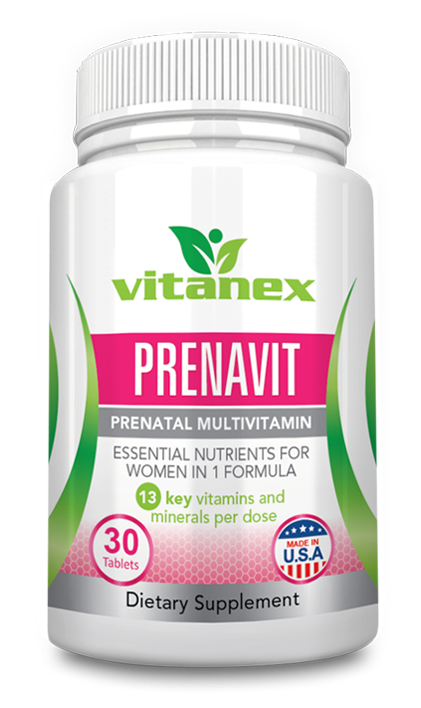Prenatal Multivitamin & Iron
Everything a pregnant woman needs in one formula
Prenavit has all the essential nutrients a pregnant woman needs for overall health. It contains 13 vitamins and minerals, including folic acid, thiamin, riboflavin, niacin, B6, and B12 for creating healthy blood cells; calcium for strong, healthy bones and teeth; vitamins A, C, D3, and E; plus zinc and iron. Each Prenavit tablet provides balanced dosages of important ingredients for pregnant women’s health.
Folic Acid, Iron, and Calcium
Folic acid helps prevent neural tube birth defects, which affect the brain and spinal cord. Neural tube defects develop in the first 28 days after conception, before many women know they are pregnant. Because about half of all pregnancies are unplanned, it's recommended that any woman who could get pregnant take 400 to 800 micrograms (mcg) of folic acid daily, starting before conception and continuing for the first 12 weeks of pregnancy.
Foods containing folic acid include green leafy vegetables, nuts, beans, citrus fruits, and many fortified foods. Even so, it's a good idea to take a supplement with the right amount of folic acid, as a backup.
Calcium is also important for a pregnant woman. It can help prevent her from losing her own bone density, as the baby uses calcium for its own bone growth.
Iron helps blood -- in both the mother and baby -- carry oxygen.
Vitamin A
Pregnant women need extra vitamin A for fetal growth and tissue maintenance and for supporting their own metabolism. The World Health Organization estimates that 9.8 million pregnant women around the world have xerophthalmia (dry eyes) as a result of vitamin A deficiency. Other effects of vitamin A deficiency in pregnant and lactating women include increased maternal and infant morbidity and mortality, increased anemia risk, and slower infant growth and development.
Recommended Dietary Allowance (RDA) is average daily level of intake sufficient to meet the nutrient requirements of nearly all healthy individuals. The recommended daily allowance established by the Food and Drug Administration for pregnant ladies is 8,000 IU/day. Supplementation of 8,000 IU vitamin A (as retinol/retinyl esters) per day should be considered the recommended maximum prior to or during pregnancy until further evaluations can be performed in the human population. It is important to determine the type of vitamin A consumed, since beta-carotene has not been associated with vitamin A toxicity in animals or man.




